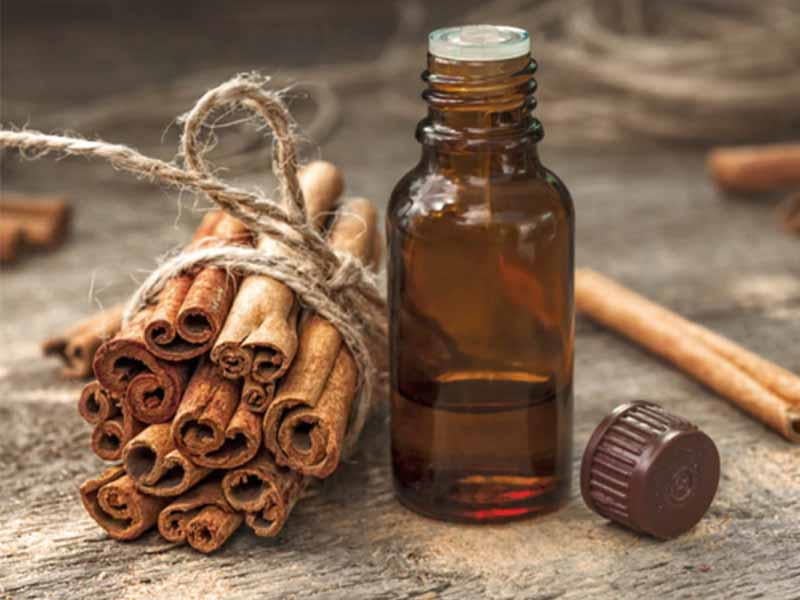
The Best Health Benefits of Cinnamon
Key Takeaways
- Cinnamon is rich in anti-inflammatory, antimicrobial and antioxidant compounds that promote optimal health.
- In clinical trials, it has been shown to reduce blood sugar levels and increase insulin sensitivity.
- Rich in fiber, this spice promotes satiety and can make weight loss easier.
- Due to its hypoglycemic properties, it may help protect against diabetes and its complications.
- Research shows that cinnamon is a natural pain reliever with few side effects. This makes a good alternative to NSAIDs.
When was the last time you had cinnamon? We’re not talking about cinnamon rolls and other goodies, but about actual cinnamon.
Have you ever tried using it in protein shakes or low-carb pancakes? It tastes amazing!
With its distinctive flavor, cinnamon gives you that holiday feel. It’s a great addition to smoothies, high-protein waffles, homemade granola, roasted nuts, and even savory dishes.

Not to mention delicious, healthy recipes like baked cinnamon apple chips, cinnamon oatmeal, or vanilla cinnamon peanut butter.
This spice is chock-full of goodness. What you may not know is that it also packs a hefty nutritional punch. In fact, the benefits of cinnamon are recognized by the medical community.
When used as part of a balanced diet, cinnamon may help reduce cholesterol and blood sugar levels in people with diabetes.
It also protects against oxidative stress and inflammation, keeps your heart healthy, and preserves brain function.
Believe it or not, cinnamon might even help you lose a few pounds. That’s right — just make sure your diet is in check.
In the meantime, read on to find out more about this spice and how it benefits your health!
What Is Cinnamon?
Cinnamon has been around since 2000 B.C. It’s one of the oldest spices on earth. Today, the most common varieties are cassia, which comes from Indonesia, and Ceylon, which is produced in Sri Lanka.
This spice comes from several tree species from the Cinnamomum genus. It’s widely used in food products, cosmetics, fragrances, supplements, essential oils, and other goods.
Its unique aroma comes from cinnamaldehyde, an organic compound with potential health benefits. Cinnamon also contains eugenol, vitamin K, iron, calcium, fiber, and protein.

Eugenol, one of its primary components, boasts antioxidant, anti-inflammatory, analgesic, and antimicrobial properties.
It’s commonly used in dental products for its ability to relieve pain and inflammation. But we’ll talk about that later.
Current research supports the benefits of cinnamon. This exotic spice offers both flavor and nutrition. It’s an excellent source of antioxidants and other bioactive compounds that promote health and well-being.
And this brings us to the next point…
Cinnamon — A Powerhouse of Nutrition
Ground cinnamon is rich in fiber, vitamins, minerals, and monounsaturated fatty acids. It also boasts higher antioxidant levels than most spices and herbs.
One tablespoon has just 19 calories and provides the following nutrients:
- 0.3 grams of protein
- 6.3 grams of carbs
- 4.1 grams of fiber
- 0.1 grams of fat
- 59% of the DV of manganese
- 6% of the DV (daily value) of calcium
- 4% of the DV of iron
- 3% of the DV of copper
- 1% of the DV of potassium
- 2% of the DV of vitamin K
- 1% of the DV of vitamin A
- 19 mg of monounsaturated fatty acids
Cinnamon also offers small amounts of zinc, magnesium, vitamin E, and B-complex vitamins.
Manganese, one of the most abundant nutrients in cinnamon, is a key component of several enzymes that support heart function, metabolism, wound healing, and bone health.
The human body needs this mineral to produce superoxide dismutase (SOD), an antioxidant enzyme that scavenges free radicals and combats their harmful effects.
When combined with glucosamine and chondroitin, it may help relieve knee osteoarthritis symptoms and reduce joint inflammation.

Cinnamon isn’t the best source of protein, but this doesn’t mean it has no benefits for dieters and athletes. What makes it stand out is its ability to lower blood sugar levels. Plus, you can get protein from other sources, such as Old School Labs’ Vintage Brawn™.
Our signature formula delivers 24 grams of protein per serving and has no added sugars or artificial flavors. It also provides about 10% of the daily recommended intake of calcium and iron.
Here’s a quick tip: Mix a scoop of Vintage Brawn™ with eggs, oats, almond milk, and cinnamon in a blender to make delicious high-protein pancakes. Our product is sweetened with stevia, so it’s not necessary to add sugar or honey.
What Are the Benefits of Cinnamon?
Cinnamon is considered a functional food due to its therapeutic properties. As the researchers point out, its potential health benefits are due to the high levels of eugenol, camphor, cinnamaldehyde, and other bioactive compounds.
Animal and human studies indicate that cinnamon may improve cognition, protect from colon cancer, and reduce heart disease risk. It has also been proven effective against several viruses and fungi, including:
- Helicobacter pylori, a bacterium responsible for peptic ulcers
- Clostridium difficile, which causes foodborne infections
- Staphylococcus aureus
- Streptococcus pneumoniae
- Escherichia coli
- Bacillus subtilis
- Aspergillus fumigatus
These pathogens have been linked to several acute and chronic conditions, from foodborne illnesses to pneumonia and tuberculosis. Some are resistant to antibiotics and other conventional drugs.

Cinnamon also exhibits cholesterol-lowering, hypoglycemic, antioxidant, and neuroprotective effects.
For example, a 2017 review published in the BMC Complementary and Alternative Medicine suggests that this spice may reduce blood pressure and cholesterol levels in healthy adults.
On top of that, it has no side effects and doesn’t cause organ toxicity. There is a risk for mild adverse reactions, such as nausea and bloating, but these are rare and go away within days.
1. Is Your Blood Sugar Out of Whack? Spice Up Your Meals with Cinnamon
Perhaps one of the best-known benefits of cinnamon lies in its ability to improve blood sugar levels. Several studies conducted over the years confirm its hypoglycemic action.
In a clinical trial, subjects who consumed 250 milligrams of cinnamon twice a day for three months experienced a significant decrease in oxidative stress.
Along with inflammation, oxidative stress is a major risk factor for diabetes, cardiovascular problems, and age-related disorders.
Rich in antioxidants, cinnamon may help prevent these conditions and add years to your life.

Furthermore, it may improve glycemic control and insulin response, lowering the risk of diabetes. Consuming as little as 5 grams of cinnamon per day may increase insulin sensitivity for 12 hours or more.
Its effects are immediate, as noted in the journal Diabetes, Obesity & Metabolism. This aromatic spice can naturally lower your blood sugar levels and aid in diabetes management.
A meta-analysis of 10 clinical trials with over 500 patients has found that cinnamon may lower fasting blood glucose by more than 24 mg/dL.
The studies involved cinnamon doses of 120 milligrams to 6 grams per day for four to 18 weeks. Subjects also experienced significant increases in good cholesterol and reductions in total and LDL (the “bad”) cholesterol.
2. Cinnamon Promotes Cardiovascular Health
Diabetes is a major risk factor for heart disease. These conditions go hand in hand. Cinnamon not only protects against diabetes, but it may also improve cardiovascular health.
First of all, it’s rich in antioxidants that protect your heart from oxidative stress.
Certain compounds in cinnamon, such as 2-methoxycinnamaldehyde, cinnamophilin, and cinnamaldehyde, may help prevent atherosclerosis and other cardiovascular disorders, according to 2014 review in Evidence-Based Complementary and Alternative Medicine.

This functional food also possesses anti-hypertensive effects. Basically, it may help lower blood pressure and slow down the progression of hypertension in people with diabetes, as noted in the above review.
Furthermore, it has been shown to improve blood lipids in both animal and human studies.
The consumption of 1 to 6 grams of cinnamon per day may lower triglycerides and cholesterol levels, protecting against cardiac events.
3. Use Cinnamon for Pain and Inflammation
Struggling with PMS, joint pain, and other aches? Cinnamon can help.
In fact, this spice is nearly as effective as the popular drug ibuprofen for menstrual pain, according to a 2015 study featured in the Journal of Clinical & Diagnostic Research.
Researchers compared the effects of cinnamon, Ibuprofen, and placebo on 114 women with primary dysmenorrhea. This condition causes severe lower abdominal pain before or during menstruation.
Cinnamon reduced pain duration and severity to a greater extent than placebo. Its effects were slightly lower compared to those of Ibuprofen.

So why wouldn’t you take Ibuprofen instead?
Like most NSAIDs, this pain reliever has potential side effects. These include but are not limited to:
- Rapid weight gain (due to fluid retention)
- Kidney problems
- Difficulty breathing
- Anemia
- Poor appetite
- Tinnitus (ringing in the ears)
- Digestive discomfort
- Nausea and vomiting
- Changes in bowel habits
In rare cases, it may cause severe skin reactions and liver problems.
Additionally, it can interact with other medications, such as aspirin. If you have asthma, kidney disease, diabetes, or stomach ulcers, ibuprofen may worsen your symptoms.
Cinnamon has none of these side effects.
Eugenol, a natural compound in this spice, displays analgesic, anesthetic, and anti-inflammatory properties, reports the U.S. National Library of Medicine.
This chemical may have adverse effects, but cinnamon only contains small doses of eugenol. Therefore, it’s unlikely to affect your health.
As mentioned earlier, there are no major side effects associated with this food ingredient.
4. Can Cinnamon Help with Weight Loss?
Cinnamon is promoted as a natural weight loss aid. This spice won’t boost your metabolism or burn fat, but it may reduce some of the damage caused by bad eating. Plus, it’s high in fiber, keeping you full longer.
Let’s recap: cinnamon lowers blood sugar and improves insulin response — both key components for maintaining a healthy weight.
A single tablespoon provides more than 4 grams of fiber — that’s about 17% of the recommended daily intake.

This nutrient promotes satiety, curbs hunger, and keeps your blood glucose levels within a normal range. On top of that, it may help prevent and relieve constipation, improve digestion, and balance the gut flora.
All these factors combined can facilitate weight loss.
However, cinnamon alone is unlikely to help you slim down. What matters most is your overall diet and activity level. If your diet looks good but you’re not losing weight, it’s time to get help.
Try Vintage Burn™, our muscle-preserving fat burner. It’s made with all-natural ingredients that will rev up your metabolism and help you torch body fat while maintaining lean muscle mass.
Our formula contains green tea extract, caffeine, raspberry ketones, and other compounds with proven results.
We’re not saying that you shouldn’t use cinnamon for weight loss, because spice can be a great ally in the battle against the bulge.
Try these low-carb cinnamon recipes to curb sugar cravings without giving up flavor:
Low-Carb Cinnamon Smoothie
If you’re on a low carb or keto diet, satisfy your sweet tooth with this cinnamon smoothie. It’s sugar-free and low in carbs, so you can enjoy it without the guilt.

Ingredients
- 1/2 cup water
- 1/2 cup coconut or almond milk
- 1 tsp cinnamon
- 1 cup Vanilla Milkshake protein powder
- Stevia to taste (optional)
- Ice cubes
Directions
- Blend all ingredients until smooth.
- Enjoy it cold.
Feeling hungry? Add a tablespoon of chia seeds. They absorb about 27 times their weight in water, filling you up quickly.
Best Ever Cinnamon Roll Ice Cream
Who says you can’t have ice cream while on a diet? Try this delicious cinnamon roll ice cream recipe — you’ll get hooked to it from the first bite!

Ingredients
- 2 cans of coconut milk
- 1 small avocado
- 1 scoop Wicked Chocolate protein powder
- 2-3 tsp cinnamon
- 2 tablespoons butter
- 1 tsp vanilla extract
- 1 pasteurized egg yolk
- Stevia to taste (optional)
Directions
- Mix all ingredients in a high-speed blender.
- Pour the mixture into a large pan and freeze it or use an ice cream maker.
- Remove it from the freezer a few hours later, let it sit out for 5-10 minutes, and enjoy!
High-Protein Cinnamon Mug Cake
We all have those moments when we want to eat something good but time isn’t on our side. Sure, there are stores at every corner, but that’s not really an option — especially when you’re on a diet.
That’s why we decided to share this easy high-protein cinnamon mug cake recipe. It’s ready in minutes!

Ingredients
- 2 tablespoons almond flour
- 1 scoop Chocolate Coconut protein powder
- 1 egg
- 1/2 tsp ground cinnamon
- 1 tbsp coconut oil or butter
- 1/4 tsp baking soda
- Extra dark chocolate chips (optional)
- Liquid stevia to taste (optional)
Glaze:
- A pinch of cinnamon
- 1/2 tsp coconut or almond milk
- 1 tsp butter, melted
Directions
- Grease a microwave-safe mug with cooking spray
- Blend the almond flour, protein powder, egg, coconut oil, cinnamon, stevia, and baking soda
- Pour the mixture into the mug
- Microwave for 80-90 seconds
- Top with glaze
- Serve warm
How Much Is Too Much? The Side Effects of Too Much Cinnamon
As mentioned earlier, cinnamon is likely safe for most people. Like with everything else, moderation is the key.
However, there are some potential drawbacks you should be aware of.
First of all, this spice boasts hypoglycemic properties. If your blood sugar levels are already low, cinnamon may not be the best choice.
Eating too much of it can lead to hypoglycemia, a condition that causes jitters, headaches, blurred vision, behavioral changes, abnormal heartbeat, confusion, and seizures, among other symptoms.
In general, hypoglycemia is a complication of type I diabetes. It may also occur during fasting or food restriction as well as during intense physical activity.

Another potential side effect of cinnamon is related to cinnamaldehyde, a common allergen.
When consumed in high doses, this compound may cause mouth sores. You may also experience a burning sensation and mild pain in the mouth.
However, these side effects are rare and only affect those who are allergic to it.
Coumarin, a phytochemical in Cassia cinnamon, may affect the liver when ingested in large doses. This substance exhibits carcinogenic and hepatotoxic properties.
Stay on the safe side and use this spice in moderation to avoid any adverse effects.
Do You Need to Worry?
This spice is considered safe when consumed in small amounts. The upper limit for coumarin is 0.1 milligrams per kilogram of body weight— that’s about one teaspoon of cassia cinnamon. Ceylon, on the other hand, is significantly lower in coumarin, so you can use more of it.
The benefits of cinnamon outweigh its potential risks. Most individuals will never experience the above side effects.
Not only is this spice delicious, but it also keeps your blood sugar low, supports cardiovascular health, and destroys disease-causing bacteria. Plus, it’s a natural pain reliever.

Go ahead and experiment with cinnamon in the kitchen! Add it to smoothies and protein shakes, recreate your favorite cinnamon rolls, or sprinkle it over roasted almonds and nut mixes.
Do you have any tips for using cinnamon? What about some simple recipes? Share them below — we want to hear from you!











